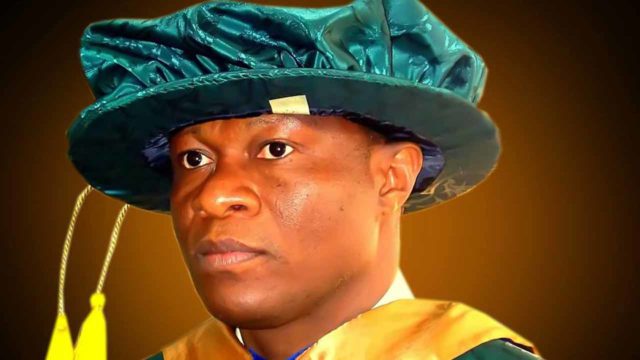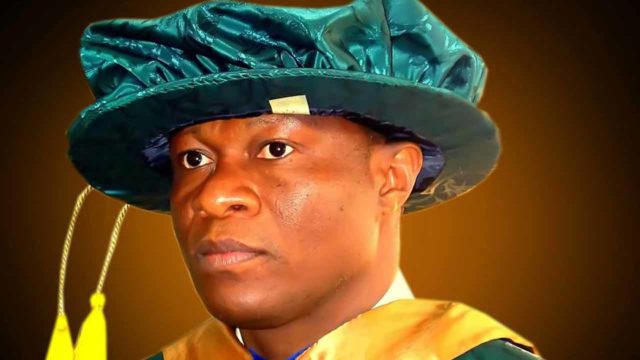
The threat of a four-year jail term has not deterred students at the University of Abuja (UNIABUJA) from being involved in examination malpractice, the ignominy of being ex-convicts or on the sex offenders’ register has not kept the institution’s eggheads away from harassing female students and forgery, writes Head, Education Desk, IYABO LAWAL
In 2017, when the National Assembly proposed a 10-year jail term for anyone involved in examination malpractice, not a few thought it was overkill. Yet, between that time and now, students, parents and teachers have continued to carry on with cheating in exams without any scruples.
The proposed 10-year jail term was to replace the law on examination malpractices, which stipulated four-year imprisonment with an option of N100, 000 fine.
Last December’s expulsion of 100 students at the University of Abuja aptly illustrates the rot in Nigeria’s education.The institution had announced the expulsion of 100 students (72 undergraduates and 28 postgraduate students), for their involvement in examination misconduct.
According to a statement by the spokesperson for UNIABUJA, Habib Yakoob, five other undergraduate students were rusticated for one academic session; three for one semester while three postgraduate students were to stay out of school for one academic session.
The university’s Senate, at its 174th regular meeting held on November 6, considered the report and recommendations of the central examination misconduct committee, and after due diligence, approved the expulsion/rustication of the students.
In the last two decades, academic excellence has become synonymous with examination malpractice as Nigeria faces a huge task of making cheating at school exams unattractive. With much ado over nothing, the government and school authorities have often watched helplessly as academic fraud trumps scholarly honesty.
But the latest rustication of students at UNIABUJA gives some hope, expelling 100 students in one fell swoop. The university said among the undergraduate students expelled, 27 were in 400 Level; 19 in 300 Level, 16 in 200 Level, two are in 100 Level while five are in their 5th, 6th, and 7th session.
The breakdown further revealed that 47 of the expelled students were from the faculty of science, 23 from the faculty of management sciences, 20 from the faculty of social sciences, and 10 others cut across other faculties.
Meanwhile, the affected students were directed to hand over any of the university’s property in their possession, including their identity cards, to their heads of department and unit as they were instructed to vacate the campus immediately. The institution threatened to deal with any student who violated the instruction.
The devastating effects of examination malpractices are usually expressed through the erosion of creativity, resourcefulness, ingenuity, technical know-how, and moral values. Industries and corporate organisations suffer because people who are qualified for the jobs are in the real sense not qualified for the jobs – they cheated their way through, most often through examination malpractices.
The older generation would easily say that today’s students are lazy and are adept at cheating during exams but the history of cheating in exams is as old as Nigeria.
Long before 1960, students in the country had been cheating their way through to success. Examination malpractice was first recorded in the country in 1914. During that year, it was reported that the question papers of the senior Cambridge local examinations were seen by candidates before the scheduled date of the exam. Ever since then, examinations and students have never remained the same again.
Even though the Federal Government promulgated laws, which stipulated a four-year jail term for anyone found guilty of examination malpractice, the act has become the norm rather than the exception.
In a nation where exam malpractice thrives, many of its citizens will end up being insensible, dishonest, ignorant, narrow-minded, myopic, deceptive, and disingenuous. Examination malpractice puts youths and professionals in a situation that leads to a future of socio-political and economic bankruptcy.
Sometimes, when caught, students have had to repeat classes, retake the exams, dismissed from school; thus wasting money, time and efforts that could have been put to productive use. The importance of examination for diagnosis, placement, classification and quality control in schools has been eroded.
Stakeholders agreed that the fight against examination malpractice is a collective one and must be fought to a logical conclusion for the sector to experience a positive turnaround.
You will know there is a sense of hopelessness hovering around Nigeria’s academic system when administrators and the government are considering and deploying operatives of the Independent Corrupt Practices Commission (ICPC) and Economic and Financial Crimes Commission (EFCC) to tackle examination malpractice in the country.
Cheats in the country’s academic ecosystem are not playing catch-up. They are matching the various academic institutions’ measures to deal with the embarrassing and insidious menace.
Cheating has become so glamourised in Africa’s most populous nation that a cheat strolled into the federal parliament to become the number four most powerful individual. He was named and shamed. But not nailed. He got a state pardon and found his way back into the government. With what academic qualifications?
More and more Nigerians are seeing examination malpractice as a norm or they are becoming numb to the insidious plague.“He who knows the way knows the books” is a common statement in Nigerian schools. The two words that interpret the statement are ‘examination malpractice’, a menace that has become a norm, and the undoing of quality education in Nigeria.
The fight against examination malpractice in Nigeria has been ongoing for years, but it has built a strong defense line fortified by characters within: students, teachers, parents, and poverty. All this combined to make the hope of victory over it a mere dream. The birth of exam malpractice in Nigeria could be traced to 1914 when it was reported that the question papers of Senior Cambridge local examinations were leaked to the students even before the examination day.
From then on, the practice gradually became an unwelcome guest who has refused to leave. Eventually, it became contagiously bold, infecting more and more people. Those who would have frowned at it saw it as an easy way to walk over, and the trend escalated to an abysmal state that has swallowed not only quality education but its effect in the society.
Parents, teachers, and students have become yoked in the cynicism. Greed, meager wages and underpayment of academic staff have provided the sanctuary for examination malpractice to thrive. Private schools’ administrators advertise special centres and charge exorbitant prices for examination registration. In some cases, students choose whether to sit for examinations or have someone else sit in their stead.
At UNIABUJA, exam malpractice among students is just one side of the institution’s bad coin. The other side is the rot in morals and professionalism among the lecturers.
In recent times, lecturers at the university have become less sterling in qualities as some were accused of forgery, sexual misconduct and exam aiding and abetting. Also last December, the school had dismissed two professors (Adeniji Abiodun, a professor of the department of animal science, faculty of agriculture and Agaptus Orji, a professor of the department of science and environmental education and approved the demotion of two others (Robert Dajal of the department of science and environmental education,; and Gana Sunday of the department of animal science for alleged misconduct.
The decision was taken at the university’s 85th council regular meeting held on December 11 and 12, 2019, after considering reports and recommendations from its disciplinary committee, which was approved following due diligence.
A female student of the university had last July, alleged that a professor in the department of agriculture demanded for sex if she wanted to pass a course the professor was teaching as of that time. Prior to the decision of the institution, the lecturer had been issued a query after he was said to be caught pants down during a sting operation by policemen of the Gwarinpa police station.
It was gathered that following a threat by the lecturer that the student, with registration number: 16211546, would not pass a course he was taking unless she gave in to his sexual demands, she reported the matter to security operatives, who organised a sting operation.
The university said in a statement: “Council at its 85th Regular Meeting held on Wednesday, 11th and Thursday, 12th December 2019, considered reports and recommendations from its Disciplinary Committee and after due diligence, approved the termination of appointment of two Professors for various acts of misconduct: (1) Professor Adeniji Adedayo Abiodun of the Department of Animal Science, Faculty of Agriculture, for inappropriate relationship with a female student which is a misconduct of ‘scandalous and disgraceful nature’ as provided in Section 16, subsection 3(c) of the University of Abuja Conditions of Service for Senior Staff (1999), ‘Falsification of academic records’ and ‘aiding and abetting of examination malpractice’ in line with section 7, subsection 1b (ii) & (v) of the University of Abuja Conditions of Service for Senior Staff (1999).
“Professor Agaptus Buzo-Chibuzo Orji of the department of science and environmental education,, for ‘falsification of academic records’, ‘aiding and abetting of examination malpractice’, in line with section 7, subsection 1b(ii)&(v) of the University of Abuja conditions of service for senior staff (1999), ‘corruption and dishonesty’ in line with Section 7, subsection 1b (iv) of the University of Abuja condition of service for senior staff (1999).”
It added, “Council also approved the demotion of Dr. Robert Dajal, department of science and environmental education by a rank, from Associate Professor to senior lecturer, and Mr. Gana Emmanuel Sunday Defian, department of Animal Science by two ranks, from lecturer 1 to Assistant Lecturer, for their complicity in various acts of misconduct inimical to the good image of the university.
“The University of Abuja wishes to restate its commitment to high moral standards and determination to take appropriate disciplinary measures against any act of misconduct perpetrated by its staff and/or students, in the interest of justice and educational development.”
At UNIABUJA, it does not rain but it pours. In January this year, the institution suspended the ongoing admission of students due to what it described as irregularities in the process.
In a memo to the admissions committee, the vice-chancellor, Abdul-Rasheed Na’Allah, said the committee did not meet up with the Joint Admissions and Matriculation Board (JAMB) guidelines for uploading all admissions on the Central Admission Processing System (CAPS).
He stated: “It has come to my notice that the JAMB admission guidelines of uploading all admissions on CAPS have not been fully met. This is totally unacceptable.“I hereby direct that all admission processes and payment of acceptance fees should be put on hold pending when all shortlisted candidates have been uploaded to CAPS. Also, subsequent admission exercise must follow this.”
The Guardian



